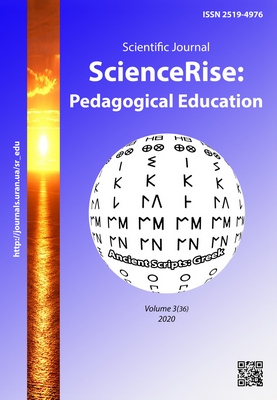Theoretical principles of introducing the play-based methods to teachers’ training in the system of postgraduate education
DOI:
https://doi.org/10.15587/2519-4984.2020.201410Keywords:
professional readiness, play-based methods, New Ukrainian school, learning through playAbstract
The article analyzes the theoretical principles of teacher training in the system of postgraduate education for the introduction of play-based methods. It generalizes the scientific approaches of understanding the essence of the individual's readiness for the professional activity in general and pedagogical activity in particular. It is stated, that the readiness of a teacher for the professional activity is an integrative professional and personal phenomenon, the content of which is the integration of value-orientation, cognitive, constructive and reflexive components, and which is the result of long professional training and self-training of a specialist, new stage of his/her development. The peculiarities of the professional activity of elementary school teachers in modern conditions require the possession of play-based teaching methods, which are active in nature. Based on the analysis of the principles of the activity-based approach in education, it is stated, that they put forward their requirements for primary school teachers, including systematic formation of subjectivity as a teacher's ability to be an agent of childhood. The article analyzes the provisions of the integrative “learning through play” approach and the requirements for primary school teachers, which ensure the formation of students' learning experience with the help of the play resource. The work presents an author's understanding of the essence of the primary teacher's readiness to introduce the methods as an integrative personal-professional education, the system characteristics of a specialist, which determines his/hers ability to effectively use play-based teaching methods in the educational process and consists of value, cognitive and constructive components. Preparing a teacher for the introduction of play-based teaching methods is a complex and lengthy process that, in today's context, should take place in the space of postgraduate education
References
- Pro osvitu (2017). Zakon Ukrainy No. 2145-VIII. 05.09.2017. Available at: https://zakon.rada.gov.ua/laws/show/2145-19
- Pro povnu zahalnu seredniu osvitu (2020). Zakon Ukrainy No. 463-IX. 16.01.2020. Available at: https://zakon.rada.gov.ua/laws/show/463-20
- Pro zatverdzhennia Derzhavnoho standartu pochatkovoi osvity (2018). Postanova KabMinu Ukrainy No. 87. 21.02.2018. Available at: https://zakon.rada.gov.ua/laws/show/87-2018-%D0%BF
- Nova ukrainska shkola: poradnyk dlia vchytelia (2018). Kyiv: Litera LTD, 160.
- Lerner I. Ya. Bolevye tochki processa obucheniya. Available at: http://www.rcde.ru/method/944.html
- Martlew, J., Stephen, C., Ellis, J. (2011). Play in the primary school classroom? The experience of teachers supporting children’s learning through a new pedagogy. Early Years, 31 (1), 71–83. doi: http://doi.org/10.1080/09575146.2010.529425
- Hyvonen, P. T. (2011). Play in the School Context? The Perspectives of Finnish Teachers. Australian Journal of Teacher Education, 36 (8). doi: http://doi.org/10.14221/ajte.2011v36n8.5
- Pramling Samuelsson, I., Johansson, E. (2006). Play and learning—inseparable dimensions in preschool practice. Early Child Development and Care, 176 (1), 47–65. doi: http://doi.org/10.1080/0300443042000302654
- Pyle, A., Danniels, E. (2016). A Continuum of Play-Based Learning: The Role of the Teacher in Play-Based Pedagogy and the Fear of Hijacking Play. Early Education and Development, 28 (3), 274–289. doi: http://doi.org/10.1080/10409289.2016.1220771
- Bozhovich, E. D. (Ed.) (2005). Razvitie subekta obrazovaniya: problemy, podhody, metody issledovaniya. Moscow: PERSE, 400.
- Leontev, A. A. (2001). Chto takoe deyatelnostnyj podhod v obrazovanii? Nachalnaya shkola: plyus-minus, 1, 3–12.
- Bodro,v V. A. (2006). Psihologiya professionalnoi prigodnosti. Moscow: PER SE, 511.
- Derkach, A. A. (2012). Psihologo-akmeologicheskie osnovaniya i sredstva optimizacii lichnostno-professional'nogo razvitiya konkurentosposobnogo specialista. Akmeologiya. Available at: https://cyberleninka.ru/article/n/psihologo-akmeologicheskie-osnovaniya-i-sredstva-optimizatsii-lichnostno-professionalnogo-razvitiya-konkurentosposobnogo
- Bershadskii, M. E., Guzeev, V. V. (2003). Didakticheskie i psihologicheskie osnovaniya obrazovatelnoi tekhnologii. Moscow: Centr «Pedagogicheskii poisk», 256.
- Isaev, I. F. (2004). Professionalno-pedagogicheskaya kultura prepodavatelya. Moscow: Akademiya, 206.
- Kruchinina, G. A. (2009). Formirovanie psihologo-pedagogicheskoi kompetentnosti specialistov v usloviyah informatizacii vysshei professionalnoi shkoly. Nizhny Novgorod: NF URAO, 256.
- Slastenin, V. A., Isaev, I. F., Mishchenko, A. I., Shiyan, E. N. (2013). Pedagogika. Moscow: Shkola-Press, 576.
- Pro zatverdzhennia profesiinoho standartu "Vchytel pochatkovykh klasiv zakladu zahalnoi serednoi osvity" (2018). Nakaz Ministerstva sotsialnoi polityky No. 1143. 10.08.2018. Available at: https://zakon.rada.gov.ua/rada/show/v1143732-18
- Cole, M., John-Steiner, V., Scribner, S., Souberman, E. (1978). Vygotsky L. S. Mind in society: The development of higher psychological processes. Harvard University Press. Available at: http://ouleft.org/wp-content/uploads/Vygotsky-Mind-in-Society.pdf
- Volobuieva, S. V. (2017). Innovatsiini tekhnolohii navchannia. Kyiv: NTU, 172.
- Parker, R., Thomsen, B. S. (2019). Learning through play at school. A study of playful integrated pedagogies that foster children’s holistic skills development in the primary school classroom. White paper. The LEGO Foundation, 75.
- Zosh, J. M., Hopkins, E. J., Jensen, H., Liu, C., Neale, D., Hirsh-Pasek, K. et. al. (2017). Learning through play: A review of the evidence. White paper. The LEGO Foundation.
Downloads
Published
How to Cite
Issue
Section
License
Copyright (c) 2020 Оксана Юріївна Рома

This work is licensed under a Creative Commons Attribution 4.0 International License.
Our journal abides by the Creative Commons CC BY copyright rights and permissions for open access journals.
Authors, who are published in this journal, agree to the following conditions:
1. The authors reserve the right to authorship of the work and pass the first publication right of this work to the journal under the terms of a Creative Commons CC BY, which allows others to freely distribute the published research with the obligatory reference to the authors of the original work and the first publication of the work in this journal.
2. The authors have the right to conclude separate supplement agreements that relate to non-exclusive work distribution in the form in which it has been published by the journal (for example, to upload the work to the online storage of the journal or publish it as part of a monograph), provided that the reference to the first publication of the work in this journal is included.







